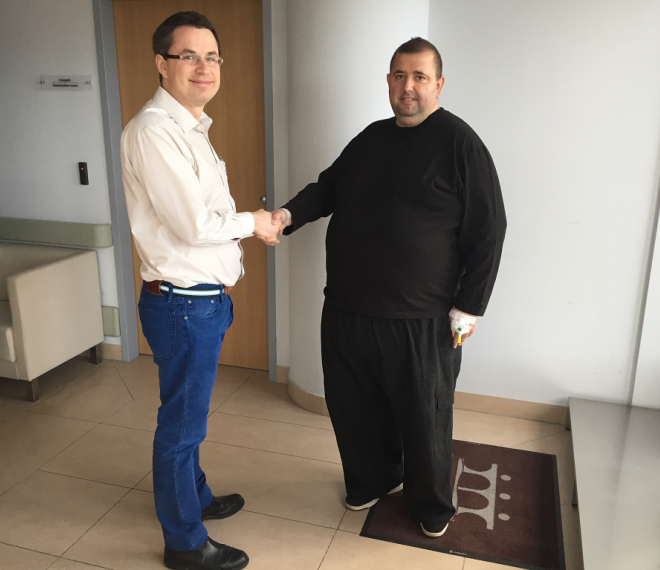Hard questions, honest answers - part 2

What about having sex? How long after the operation can the patient have sex again?
When it no longer causes pain. This can be expected to take place after a few days, but it is definitely worth planning for after discharge from the hospital.
The basis of successful gastric bypass surgery is lifestyle change, an integral part of which is regular exercise. When and what sports can you do after surgery?
Usually 2-3 weeks are enough for laparoscopic surgery scars to heal. After that, you can easily plan longer walks and excursions, and starting from the 4th week, you can also start jogging, cycling, swimming, and aerobics. It is worth waiting 3 months to lift heavier weights alone, but it can also be done after that. 2 x 45-minute workouts per week are recommended for everyone to develop an optimal body weight.
During significant weight loss following gastric bypass surgery, the skin may stretch and cause aesthetic problems. When should you consult a plastic surgeon?
The skin does not stretch during weight loss, but during weight gain. It is worth waiting at least 18 months after the operation, during which time 70-75%, but even 100% of the excess weight can be lost. After that, you can easily adjust the skin and adjust body parts that require corrections to the new body shape.
How does a patient's digestion change after surgery - and can it cause problems?
There are patients who report a "gurgling" of the intestines after the operation, which can even be heard by others. Loose stools may also develop after surgery, which is often accompanied by an increase in flatulence, but this is mainly due to the vegetables and pureed foods consumed in the weeks after surgery.
Let's be honest, the patients didn't get fat because of the excessive consumption of vegetables: for many of them, years and decades often passed without their bodies encountering this type of food - and this has a significant impact on bowel movements after surgery. In a few months, the intestines get used to the changed conditions, so these symptoms improve a lot. I also have good news: after the operation, the acid reflux improves significantly!
After surgery, the volume of the stomach is significantly reduced. What happens if the stomach operated patient eats more?
The small stomach fills up quickly, everyone should experience this. In 1-1 cases, it will happen that the last bite should not have gone down, and it will soon come back, but this is not necessarily a problem, this is also part of the learning process. Beyond the unpleasant experience, it probably does not cause lasting damage, but in repeated form it can lead to dilatation of the small stomach. In this case, the volume of the small stomach increases and can contain more and more food, i.e. it opens the way to regaining weight.
Dr. Péter Vasas with one of his patients, László Mikla
The goal of gastric bypass is to induce significant weight loss in the patient. What are the risks of sudden weight loss?
Almost everyone develops hair loss, which typically occurs between 3 and 6 months after surgery. Not much can be done against this, it is a natural reaction on the part of the body. Regular vitamin supplementation is recommended, and in this case the amount can be significantly reduced.
Significant loosening of the skin is also a consequence of sudden weight loss. You can "defend" against this with regular exercise and training, in which case the body fills the empty space of the depleted fat tissue with muscle, so it is not so noticeable.
You can hear about operated patients trying to "trick" their body and still eating sweets (or other foods) excessively, but in a different form.
Self-discipline is key: surgery is just a crutch, you have to know how to use it well. Cheating has a price: the concentrated carbohydrates that enter the small intestine are called it will cause dumping syndrome, i.e. it can lead to sweating and dizziness. But it is better not to experience this.
Is there a risk of regaining weight?
The surgery in the short and medium term, i.e. approx. It almost always generates weight loss for 3 years. In the long run, however, the success rate is somewhat lower, but still 85-90%. Therefore, obesity may develop, but this most often occurs due to the return of previous inappropriate eating habits.
What I tell all my patients: surgery is a tool that must be used properly. Unfortunately, we also have a patient operated on at the Duna Medical Center who lost very little weight, but fortunately this is very rare.
When can the patient think that he will not gain weight again? Will this moment even come?
Never. Surgery only works with permanent lifestyle changes and optimization, rarely by itself. For this reason, regular exercise and moderate nutrition are recommended in the future, but my patients do not experience this as a burden, but as a huge opportunity. They were given the opportunity of a new life after being released from the "fat prison". Many people realize their life's dream by being able to go skiing with their family, run, bike every day, and sit in a normal airplane seat without a belt extender...
That is why we are preparing to run the 35th Budapest Half Marathon (21km) with patients who have already successfully lost weight, which we are planning for September 2020. Our goal is to give motivation to those who are still thinking about surgery. The name of the team will be "Life 2.0: we will show that we can succeed too".
In the previous part, we asked the doctor about the surgery, the complications, the possible reasons for the reoperation, the price of the surgery, and the possibility of the development of cancerous diseases.
Read the first part of the interview!
Get to know our doctor who performed the procedure:
